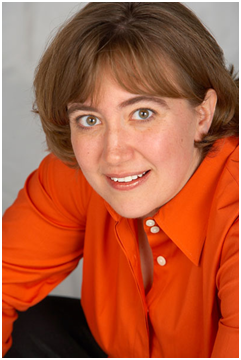Laboring to Speak from the Shadows – by Jerusha Neal
Introductory note: In medieval art, as in this contemporary painting, Mary has been regularly depicted with a book in her hand – underscoring her role as Mother of the Word. In these reflections on preaching, Anne Weirich, Jerusha Neal and Abigail Henrich take this designation seriously, reinterpreting Mary’s story to refer, not simply to the experience of childbirth and mothering, but also to the very real, word-driven labor of spoken proclamation. Using Michael O’Brien’s luminous depiction as a common point of reference, they ask: How might Mary’s experience in bearing the Word to the world illuminate the preacher’s act of bearing witness?
The Christian Century recently ran a two-page review of Rev., a television show that is has become my current obsession (October, 17, 2012.) The British sitcom, available at Hulu.com, describes the ministry of Adam Smallbone, an Anglican vicar serving a struggling, inner-city, London parish. On an average Sunday, there might be twenty bodies in the drafty, historic sanctuary – singing along to a CD player. As The Century attests, there is little “theology of glory” here. Having served as both a pastor and pastor’s wife, there are days when the show is too full of gallows-humor for my taste. Adam’s difficulties can overshadow God’s transforming power – at least, by any human standard of evaluation. But even so, I’ve been grateful for a depiction of a pastor that articulates the challenge of ministering in broken places. After watching the first episode, I turned to my husband and said, “Somebody squealed.”
Especially interesting to me, because of my work around performance and preaching, is Rev. Smallbone’s regular anxiety about how to be authentic in his role as vicar. One of the show’s major themes is the disconnect Adam feels between his personal pain and anger and his vocational duty to shepherd a congregation. These issues come to a head in the closing episode of the first season when Adam is close to denying his call, and instead finds himself at the bedside of a dying parishioner, addressed again by God in the midst of this valley of shadows. In response, Adam renews his commitment by echoing the words of Isaiah, “Here am I, send me” (Isaiah 6: 8). It is a significant moment of reckoning and a reminder that pastors finally do what they do, not on the basis of their purity or innate power, but because they have been called. It is also a reminder of the paradox at the heart of pastoral work. This vocation will never fit us like a glove; it is necessarily larger than ourselves. And yet, finally, we can never perform the vocation effectively if we allow too great a divide between our personal pain and our public face, if we cannot finally “be ourselves” in the role, with our people and with God.
In the classes I teach in Speech Communication for Ministry, these issues are on regular display. The question of how to read scripture in one’s own voice for the benefit of a believing community forces this tug-of-war into the light. When there are competing agendas between text, communal expectation and “what comes naturally” to the preacher, who wins? What if “what comes naturally” does not effectively communicate? What if the community expects a preacher that is fundamentally different than the preacher God has called? What if the text challenges both preacher and community to move outside their comfort zones of what scripture is “supposed to sound like?” These performative questions are deeply personal. They arch back to a more fundamental issue. When preachers stand to proclaim God’s Word, do their bodies, their walks with Christ, their broken performances of faith, make any difference? And if they do make a difference, how do preachers like Adam Smallbone feel like anything but a failure? How do they stand secure in God’s call, rather than their own abilities?
In conversations with pastors over the last year, I have heard Adam’s questions resonating: “I feel like nothing I say in the pulpit makes any difference.” “I feel cut off from my congregation.” “I am just playing a role. I’ve lost my voice.” “It’s been so long since I have felt anything that reminded me of the presence of God.” The shadows of pastoral work can loom large. And it is because of these shadows that many pastors burn-out or walk away, trying to be more than they are or know more than they know, tired of embodying an idealized shadow rather than the woman or man they were called to be.
When I first became interested in comparing the labor and pregnancy of Mary to the work of preaching, it was because I was interested in the question of divine and human agency in the bodily mediation of the Word. I was interested in God’s work and our work in the practice of preaching – and how Mary’s labor informed that mystery. I came to my research as a Protestant, convinced of Mary’s flawed and finite nature – despite her faithfulness. I came as a mother, aware of how an emphasis on Mary’s submission and passivity in pregnancy was only half of the story. Pregnancy and birth – while not something that one controls – are, in fact, called “labor” for a reason. But I also came to this research as a practicing preacher who found, in traditions that stressed Mary’s purity, passivity and power, very familiar baggage.
There seemed to me an odd similarity between the shadow of an idealized Mary – submissive handmaid, perfect mother, co-redemptrix – and the shadow of the ideal Protestant preacher. It was a connection officially denied. Protestants, afterall, had gone to great lengths to distance themselves from Catholic traditions of veneration. And yet, the connection was suggested in informal congregational practices and in the nagging fears of inadequacy that haunted my colleagues. It could be seen in congregational assumptions that preachers were slightly more holy than others or their prayers generally more effective. A lay-minister’s prayer at the bedside of the ill, for example, did not count for quite as much as the pastor’s own. It played out in congregational expectations of pastoral long-suffering and power – the expectation that a pastor be an all-loving, all-forgiving Mother, who, despite her humility, brought congregations to life with her carefully crafted, “relevant” words. It was revealed even in the paradox of preachers’ own expectations that they must “get out of the way” – and yet, simultaneously, “save souls” with rhetoric that “brought home” the Word with fire. It is no wonder that Adam Smallbone, and so many others, have found themselves unable to live up to the role – and have grown weary of trying. Catholic feminist, Elizabeth Johnson, in her book Truly Our Sister, suggests that the greatest danger of Marian veneration within her tradition has been the eclipse of Holy Spirit. She states, “Mary is called intercessor, mediatrix, helper, advocate, defender, consoler, counselor … she is the link between [the believer] and Christ.”[1] Does this not overshadow the Spirit’s work? The same might be asked about the work and person of the Protestant preacher. Have we – in practice, if not theology – substituted the “Queen of Heaven” for a “pulpit prince?”
When I look at Michael O’Brien’s beautiful portrayal of Mother and Child Reading the Word, my eye is drawn upward – to the dove that covers both, to the hands that reach out to hold. There is, thanks be to God, another Shadow at work in the labor of preaching. “The Holy Spirit…will overshadow you” (Luke 1: 35), the angel tells Mary. And that Shadow is, finally, what makes Mary’s labor matter.
We talk a great deal about the Word in theologies of preaching – but the work of the Spirit in mediating that Word gets significantly less attention. The first step in moving out from under the shadow of a false ideal is to reclaim our need for this different Shadow. Ironically, this means paying more attention to our human limits and particularities – not less. It is in seeing Mary as a human woman – with questions and doubts and failings – that the significance of the Holy Spirit comes into focus, as well as the value and beauty of Mary’s own bodily offering. There is a Shadow that covered Mary – and a Shadow that covers preachers, empowering our risk of exposure, vulnerability and scandal, even as it ensures that our faithfulness is, finally, not the point. The point is the Word to whom we bear witness, even as we are born anew.
For pastors to be “real” within the demands of their vocation does not mean shirking the costs of ministry or insisting on the primacy of their own voices over and against the Word or community. “Authentic,” in a Christian sense, cannot mean behaving as if difficult church people didn’t exist or one hadn’t been called to love them. It does not mean that scripture only matters when it feels “natural” on the tongue. But being “real” as a preacher doesn’t mean pretending either. Authentic preachers do not embody the “perfect pastor” or the “perfect Mother,” or even the divine Shepherd. Finally, one can only “embody” oneself – and from that finite place, one can commit to love the Word, the world and the Church through a power greater than our own. We are not called to be a shadow of ourselves – we are called to be “overshadowed” by the Spirit of God.
It is that Shadow that meets us in the valley and in the sanctuary, drawing from our hearts our stuttered assent: “Here am I, send me.”
Rev. Jerusha Neal is an ordained American Baptist pastor, actress and doctoral candidate in homiletics at Princeton Theological Seminary. Her dissertation compares the pregnancy and labor of Mary to the labor of spoken proclamation. Blessed, Neal’s forthcoming collection of dramatic monologues reflecting on Mary’s life, will be available from Cascade Publishers next year. She is married to Wes, a United Methodist pastor, and has two children, Mercy and Josiah.
[1] Elizabeth A. Johnson, Truly Our Sister: A Theology of Mary in the Communion of Saints, (New York: Continuum Press, 2003) 80.



To see Michael O’Brien’s painting, scroll down to Abigail and Anne’s pieces at the bottom of the home page.